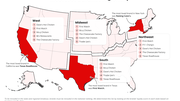News
Report: Consumers likely to share complaints about restaurant cleanliness
December 28, 2012
SCA's third annual 2012 Tork Report reveals that 92 percent of U.S. consumers said they will complain about an unfavorable dining-out experience. Of those respondents, nearly 25 percent will bring up issues regarding cleanliness.
The 2012 Tork Report, titled The Sustainability Gap, examined hygiene issues in restaurants and how likely consumers are to share information regarding restaurant cleanliness with others. Ninety-six percent of unhappy restaurant patrons are "likely" to share a complaint with family or friends and, of those, 65 percent are "very likely" to do so.
Notably, many of those unhappy patrons are complaining via social networks.
Additional key findings of the report include:
- 60 percent said they were at least somewhat likely to share that complaint with their social media networks while 65 percent said they are at least somewhat likely to share a complaint on a restaurant review site;
- 32 percent of patrons would bring up issues with poor quality product or food;
- 25 percent of patrons would bring up issues regarding poor service or issues with employees; and
- 50 percent of those surveyed say when selecting products, a business or a restaurant to patronize the topic of sustainability at least sometimes influences their choices.
The move toward sustainability
The 2012 Tork Report also shows consumers' growing concerns about business' sustainability plans. In 2012, about twice as many U.S. companies (64 percent) had or are in the process of having a sustainability plan in place compared to 2011 (38 percent).
Furthermore, 31 percent of U.S firms and 30 percent of Canadian firms say their sustainability plans are having a positive impact on the bottom line.
"We've seen sustainability continue to be important to consumers and business alike," said Mike Kapalko, sustainability marketing manager for SCA AfH Professional Hygiene in North America. "A real area of concern is the gap; companies reporting they have sustainability plans, yet they ignore the risks to their business from climate change, severe weather, or unhealthy employee habits."
While most companies have acknowledged sustainability as a necessary part of doing business, "most have not thrown their full weight behind the effort," writes sustainability expert and Tork Green Hygiene Council member Josh Radoff. In his call to action for companies to push further, he notes "we've approached the end of Corporate Sustainability 1.0, where the low-hanging fruit has been picked, and the basic levels of expectations have been met. Thus, there is a large gap between the status quo and the next level of achievement — the effort to dig down to the core of a company's social and environmental impact."
Suggested initiatives include:
- Reducing food waste: Americans waste 40 percent of the nation's food supply, the single biggest contributor to solid waste in landfills.
- Adding a universal sustainability index — a guide to help consumers and companies make smarter product choices — was deemed a good idea by three-quarters of people surveyed.
- Reduce the amount of "green washing," or false claims by companies that tout a product's environmental benefits.
The report also finds that the "people" part of the "people, planet and profit" focus written into many sustainability plans has fallen short of expectations.
For example, most people wash their hands after using the restroom. Less than half of American's wash their hands after using gym equipment, handling money or taking public transportation. Countless items — such as microwave door handles, elevator buttons and restaurant menus — are more germ-infested than restrooms.
The 2012 Tork Report combines original research conducted by Harris Interactive with commentary and additional research regarding sustainability and hygiene from several sources.
Read more about sustainability initiatives.












